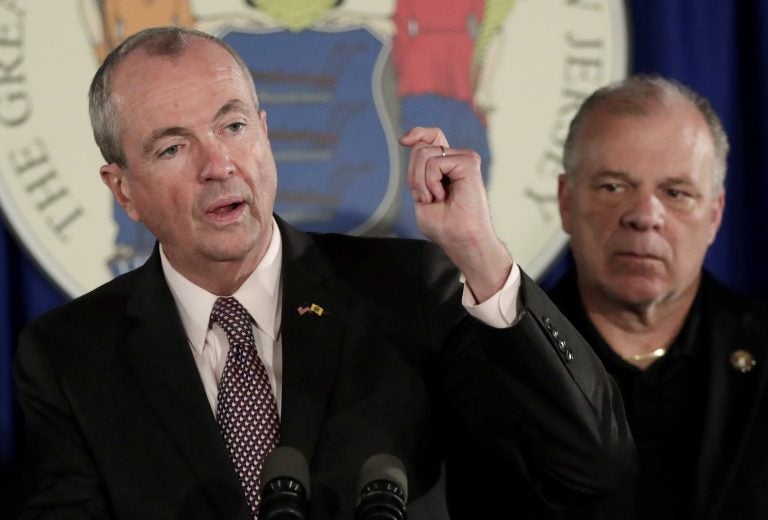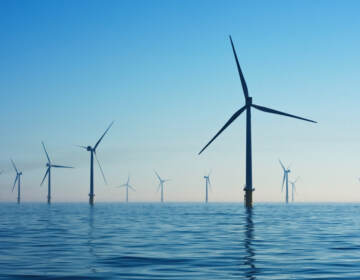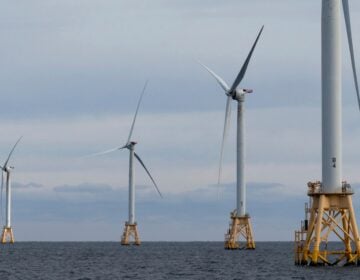‘Green’ groups ask Murphy for moratorium on new fossil-fuel infrastructure
A coalition of environmental groups stepped up calls yesterday for Gov. Phil Murphy to declare a moratorium on building any new fossil-fuel infrastructure.

In this June 30, 2018, file photo, New Jersey Gov. Phil Murphy, (left), discusses his state budget deal with Democratic legislative leaders, as state Senate President Stephen Sweeney, (right), listens during a news conference in Trenton, N.J. (Julio Cortez/AP Photo, File)
This story originally appeared on NJ Spotlight
—
Coalition reports that if the 12 natural-gas projects are built, they would undercut administration’s goal of 100 percent clean energy by 2050.
With a dozen natural-gas projects pending in New Jersey, a coalition of environmental groups stepped up calls yesterday for Gov. Phil Murphy to declare a moratorium on building any new fossil-fuel infrastructure.
At a press conference outside the State House Annex, the coalition released a report that argued the projects, if completed, would undermine the Murphy administration’s own aggressive goals to achieve 100 percent clean energy by 2050.
The projects — eight pipeline/compressor stations and four natural-gas-fired power plants — would increase the state’s greenhouse-gas emissions by 32 million metric tons, or 30 percent, according to the report. The state’s Global Warming Response Act calls for an 80 percent reduction in GHG emissions below 2005 levels by 2050.
Easing off reliance on natural gas
Murphy, who has pushed an aggressive environmental agenda, including reviving a dormant offshore-wind program, has been under growing pressure from allies to reverse the state’s reliance on natural gas. More than 40 percent of the state’s electricity is generated by the fuel, and about three-quarters of homes are heated by natural gas.
“The governor has a small but closing window, to halt the harm,’’ said Matt Smith, senior organizer for Food & Water Watch. “This is a make-or-break moment for Gov. Murphy’s environmental legacy.’’
With cheap and plentiful supplies in neighboring Pennsylvania, there has been a rapid buildout of natural-gas infrastructure in New Jersey, a trend strongly backed by former Gov. Chris Christie. The pipelines, however, have generated widespread local opposition, which has led to projects being tied up in litigation.
Climate change is an immediate and real threat to the state, according to John Reichman of Blue Wave. “We have a simple ask for this administration: Don’t make it worse,’’ he said.
He and others called on the governor to halt all pending projects until the state adopts new rules to place limits on the two main greenhouse-gas emissions — carbon dioxide and methane.
The governor’s press office did not respond to a call for comment. In the past, a spokeswoman for Murphy said the administration plans to take a hard look at the state’s energy infrastructure as part of its updating of the Energy Master Plan.
Late last year, environmentalists urged legislators to amend a bill aimed at curbing global warming to include new pollution controls on carbon dioxide, but the recommendation has yet to be taken up by the Legislature.
Beyond climate change
Beyond emissions contributing to climate change, the projects under consideration also would exacerbate New Jersey’s longstanding air-quality problems with other pollutants, such as ground-level ozone, the coalition said.
“It’s kind of scary that no one until now has done the basic math around these cumulative impacts or shared it,’’ said Ken Dolsky of the Don’t Gas the Meadowlands Coalition, a group opposed to a new gas plant in North Bergen that would supply power to New York City.
Dolsky, a primary author of the report, said it shows that the proposed gas projects would make it impossible to achieve the governor’s clean-energy objectives and what the Global Warming Response Act requires.
WHYY is your source for fact-based, in-depth journalism and information. As a nonprofit organization, we rely on financial support from readers like you. Please give today.




